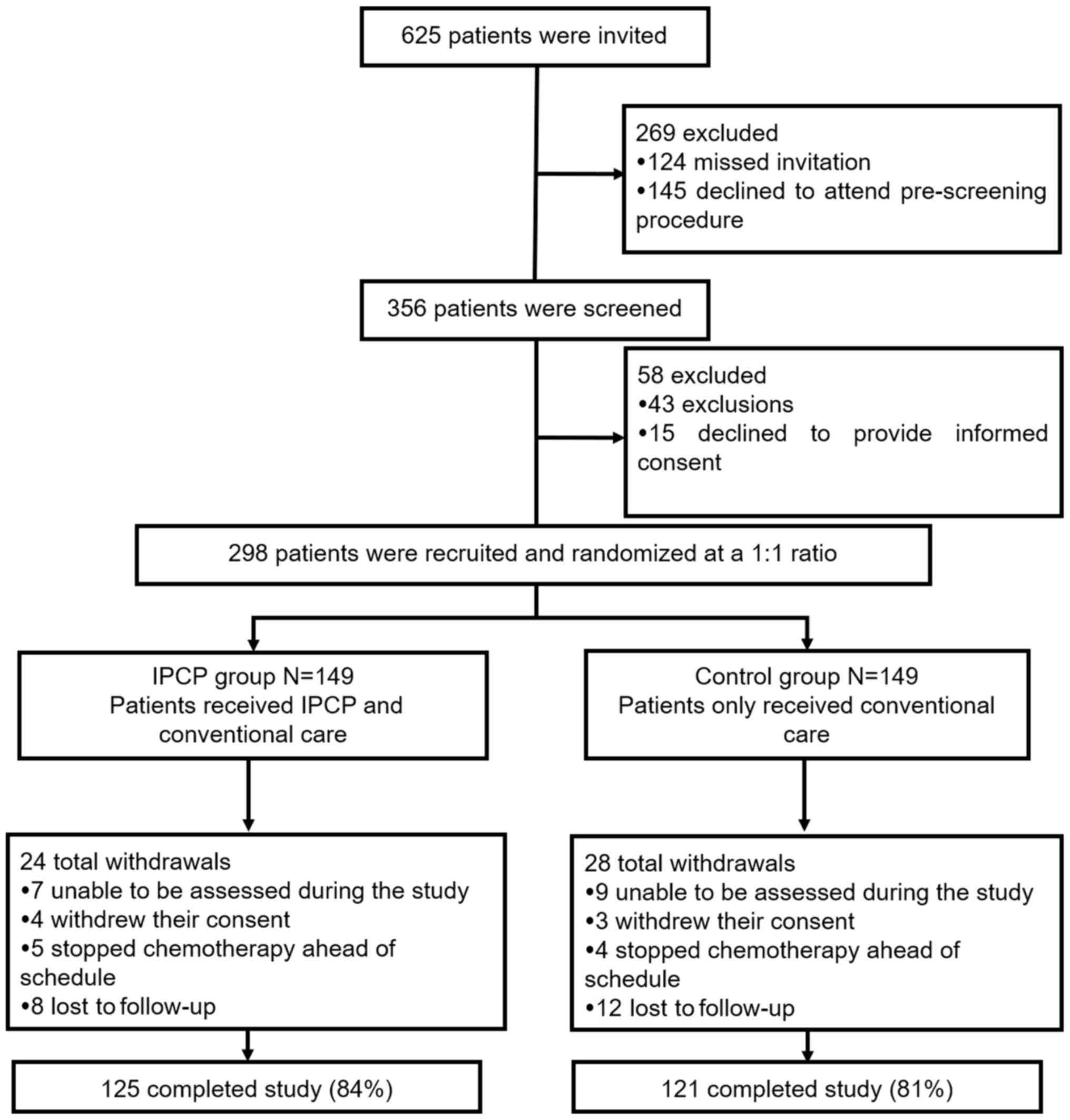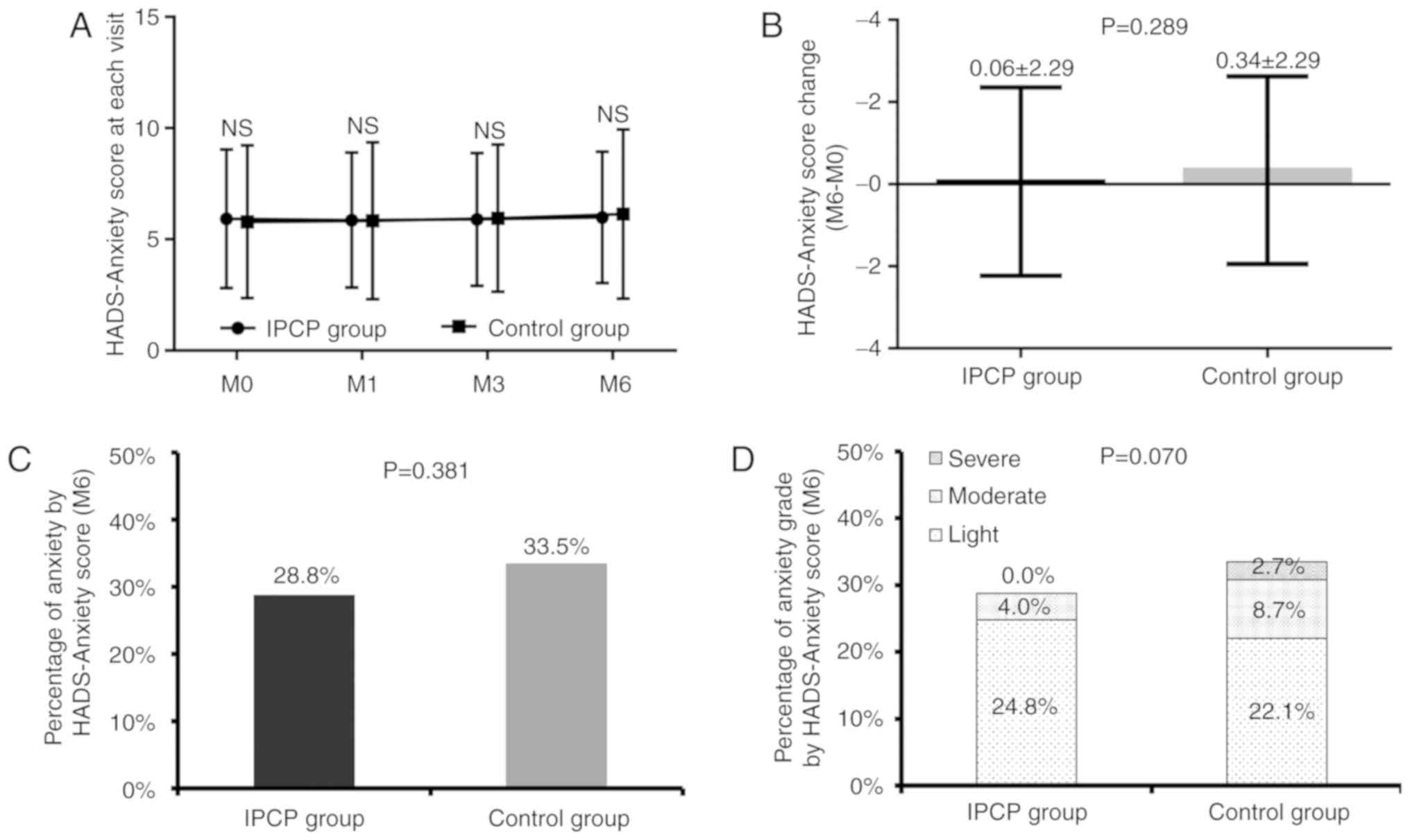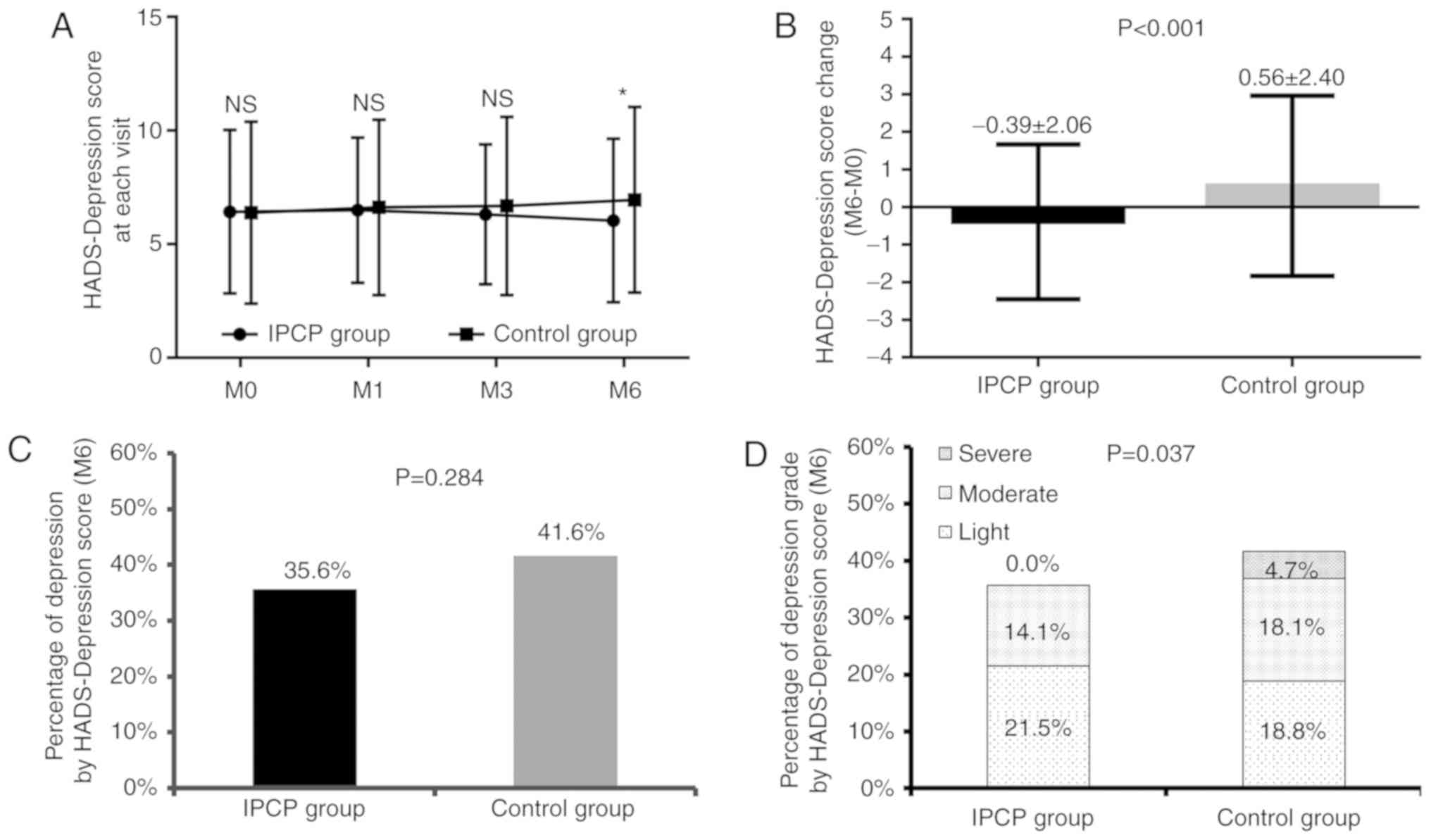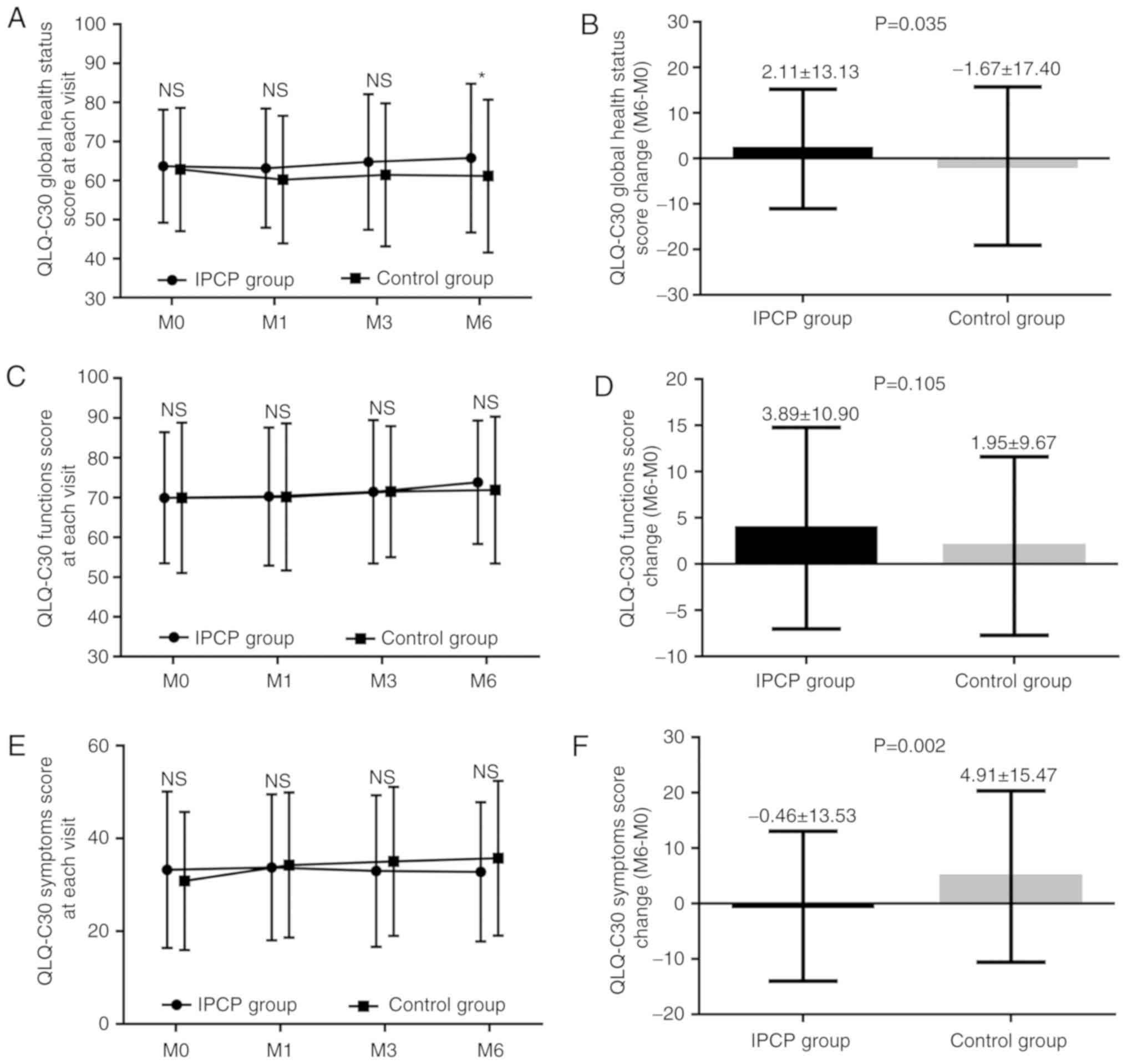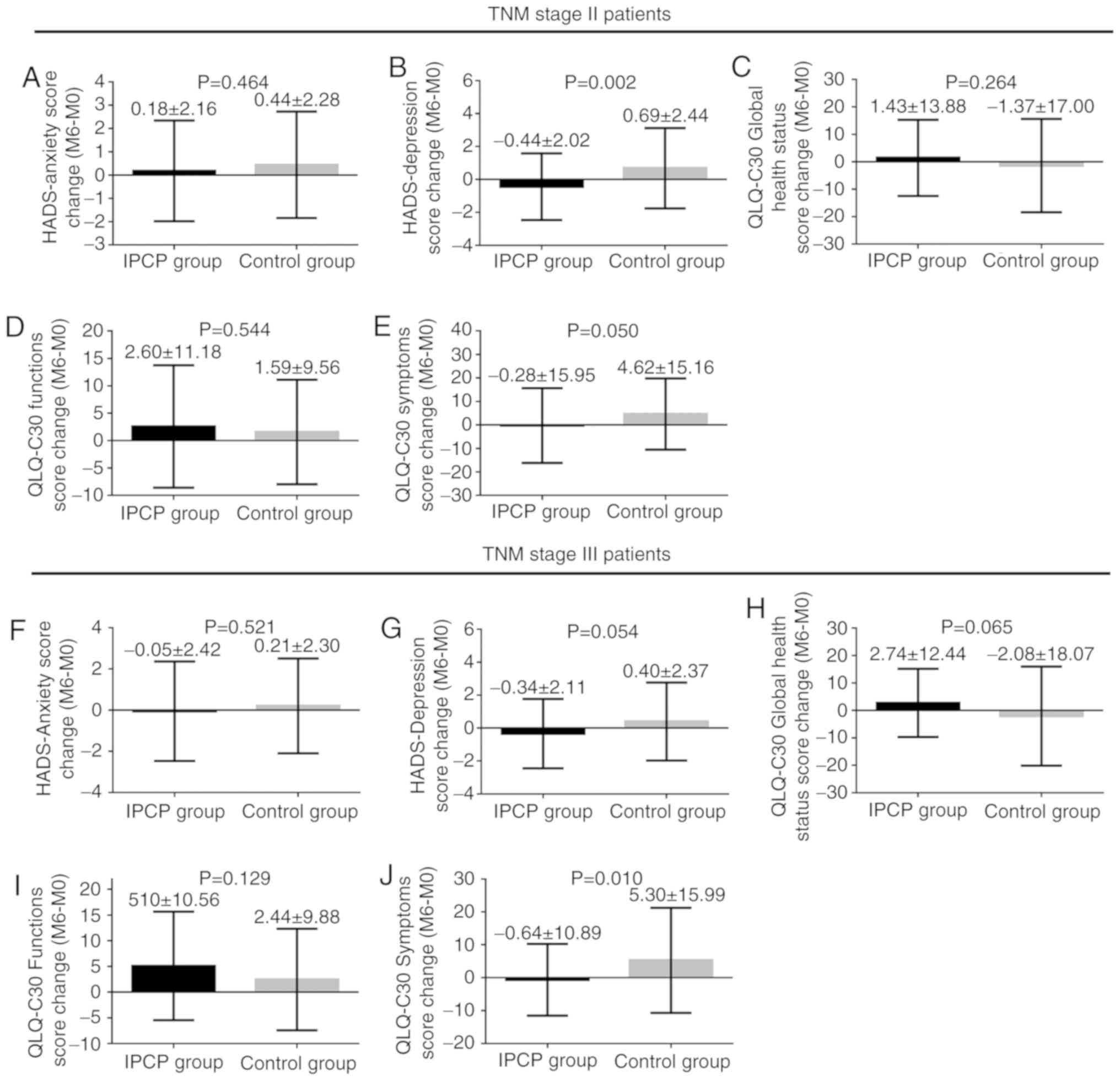|
1
|
Brenner H, Kloor M and Pox CP: Colorectal
cancer. Lancet. 383:1490–1502. 2014. View Article : Google Scholar : PubMed/NCBI
|
|
2
|
Ferlay J, Shin HR, Bray F, Forman D,
Mathers C and Parkin DM: Estimates of worldwide burden of cancer in
2008: GLOBOCAN 2008. Int J Cancer. 127:2893–2917. 2010. View Article : Google Scholar : PubMed/NCBI
|
|
3
|
Torre LA, Bray F, Siegel RL, Ferlay J,
Lortet-Tieulent J and Jemal A: Global cancer statistics, 2012. CA
Cancer J Clin. 65:87–108. 2015. View Article : Google Scholar : PubMed/NCBI
|
|
4
|
Siegel R, Ma J, Zou Z and Jemal A: Cancer
statistics, 2014. CA Cancer J Clin. 64:9–29. 2014. View Article : Google Scholar : PubMed/NCBI
|
|
5
|
Gonzalez-Saenz de Tejada M, Bilbao A, Baré
M, Briones E, Sarasqueta C, Quintana JM and Escobar A; CARESS-CCR
Group, : Association between social support, functional status, and
change in health-related quality of life and changes in anxiety and
depression in colorectal cancer patients. Psychooncology.
26:1263–1269. 2017. View
Article : Google Scholar : PubMed/NCBI
|
|
6
|
Polat U, Arpaci A, Demir S, Erdal S and
Yalcin S: Evaluation of quality of life and anxiety and depression
levels in patients receiving chemotherapy for colorectal cancer:
Impact of patient health education before treatment initiation. J
Gastrointest Oncol. 5:270–275. 2014.PubMed/NCBI
|
|
7
|
Wan Puteh SE, Saad NM, Aljunid SM, Abdul
Manaf MR, Sulong S, Sagap I, Ismail F and Muhammad Annuar MA:
Quality of life in Malaysian colorectal cancer patients. Asia Pac
Psychiatry. 5 (Suppl 1):S110–S117. 2013. View Article : Google Scholar
|
|
8
|
Tsunoda A, Nakao K, Hiratsuka K, Yasuda N,
Shibusawa M and Kusano M: Anxiety, depression and quality of life
in colorectal cancer patients. Int J Clin Oncol. 10:411–417. 2005.
View Article : Google Scholar : PubMed/NCBI
|
|
9
|
Alacacioglu A, Binicier O, Gungor O, Oztop
I, Dirioz M and Yilmaz U: Quality of life, anxiety, and depression
in Turkish colorectal cancer patients. Support Care Cancer.
18:417–421. 2010. View Article : Google Scholar : PubMed/NCBI
|
|
10
|
Medeiros M, Oshima CT and Forones NM:
Depression and anxiety in colorectal cancer patients. J
Gastrointest Cancer. 41:179–184. 2010. View Article : Google Scholar : PubMed/NCBI
|
|
11
|
Demark-Wahnefried W and Jones LW:
Promoting a healthy lifestyle among cancer survivors. Hematol Oncol
Clin North Am. 22:319–342. 2008. View Article : Google Scholar : PubMed/NCBI
|
|
12
|
Morey MC, Snyder DC, Sloane R, Cohen HJ,
Peterson B, Hartman TJ, Miller P, Mitchell DC and Demark-Wahnefried
W: Effects of home-based diet and exercise on functional outcomes
among older, overweight long-term cancer survivors: RENEW: A
randomized controlled trial. JAMA. 301:1883–1891. 2009. View Article : Google Scholar : PubMed/NCBI
|
|
13
|
Allgayer H, Owen RW, Nair J, Spiegelhalder
B, Streit J, Reichel C and Bartsch H: Short-term moderate exercise
programs reduce oxidative DNA damage as determined by
high-performance liquid chromatography-electrospray ionization-mass
spectrometry in patients with colorectal carcinoma following
primary treatment. Scand J Gastroenterol. 43:971–978. 2008.
View Article : Google Scholar : PubMed/NCBI
|
|
14
|
Xiao F, Song X, Chen Q, Dai Y, Xu R, Qiu C
and Guo Q: Effectiveness of psychological interventions on
depression in patients after breast cancer surgery: A meta-analysis
of randomized controlled trials. Clin Breast Cancer. 17:171–179.
2017. View Article : Google Scholar : PubMed/NCBI
|
|
15
|
Li Z, Geng W, Yin J and Zhang J: Effect of
one comprehensive education course to lower anxiety and depression
among Chinese breast cancer patients during the postoperative
radiotherapy period-one randomized clinical trial. Radiat Oncol.
13:1112018. View Article : Google Scholar : PubMed/NCBI
|
|
16
|
Edge SB, Byrd DR, Compton CC, Fritz AG,
Greene FL and Trotti A III: AJCC Cancer Staeging Manual. 7th. New
York: Springer; 2010
|
|
17
|
Seligman MEP, Walker EF and Rosenhan DL:
Abnormal Psychology. 4th. W.W. Norton & Company; New York, NY:
2001
|
|
18
|
Diagnostic and Statistical Manual of
Mental Disorders, Fifth Edition (DSM-5). American Psychiatric
Association. 2013.
|
|
19
|
Zigmond AS and Snaith RP: The hospital
anxiety and depression scale. Acta Psychiatr Scand. 67:361–370.
1983. View Article : Google Scholar : PubMed/NCBI
|
|
20
|
Barcaccia B: ‘Quality Of Life: Everyone
Wants It, But What Is It?’. 2016.PubMed/NCBI
|
|
21
|
Tung HY, Chao TB, Lin YH, Wu SF, Lee HY,
Ching CY, Hung KW and Lin TJ: Depression, fatigue, and QoL in
colorectal cancer patients during and after treatment. West J Nurs
Res. 38:893–908. 2016. View Article : Google Scholar : PubMed/NCBI
|
|
22
|
Van Vulpen JK, Velthuis MJ, Steins
Bisschop CN, Travier N, Van Den Buijs BJ, Backx FJ, Los M, Erdkamp
FL, Bloemendal HJ, Koopman M, et al: Effects of an exercise program
in colon cancer patients undergoing chemotherapy. Med Sci Sports
Exerc. 48:767–775. 2016. View Article : Google Scholar : PubMed/NCBI
|
|
23
|
Mols F, Schoormans D, de Hingh I,
Oerlemans S and Husson O: Symptoms of anxiety and depression among
colorectal cancer survivors from the population-based, longitudinal
PROFILES Registry: Prevalence, predictors, and impact on quality of
life. Cancer. 124:2621–2628. 2018. View Article : Google Scholar : PubMed/NCBI
|
|
24
|
Aminisani N, Nikbakht H, Asghari
Jafarabadi M and Shamshirgaran SM: Depression, anxiety, and health
related quality of life among colorectal cancer survivors. J
Gastrointest Oncol. 8:81–88. 2017. View Article : Google Scholar : PubMed/NCBI
|
|
25
|
Thomas BC, Devi N, Sarita GP, Rita K,
Ramdas K, Hussain BM, Rejnish R and Pandey M: Reliability and
validity of the Malayalam hospital anxiety and depression scale
(HADS) in cancer patients. Indian J Med Res. 122:395–399.
2005.PubMed/NCBI
|
|
26
|
Matsumoto T, Ohashi Y, Morita S, Kobayashi
K, Shibuya M, Yamaji Y, Eguchi K, Fukuoka M, Nagao K, Nishiwaki Y,
et al: The quality of life questionnaire for cancer patients
treated with anticancer drugs (QOL-ACD): Validity and reliability
in Japanese patients with advanced non-small-cell lung cancer. Qual
Life Res. 11:483–493. 2002. View Article : Google Scholar : PubMed/NCBI
|
|
27
|
Livingston PM, Craike MJ, White VM,
Hordern AJ, Jefford M, Botti MA, Lethborg C and Oldroyd JC: A
nurse-assisted screening and referral program for depression among
survivors of colorectal cancer: Feasibility study. Med J Aust 193
(5 Suppl). S83–S87. 2010.
|
|
28
|
Watanabe T, Itabashi M, Shimada Y, Tanaka
S, Ito Y, Ajioka Y, Hamaguchi T, Hyodo I, Igarashi M, Ishida H, et
al: Japanese society for cancer of the colon and rectum (JSCCR)
guidelines 2014 for treatment of colorectal cancer. Int J Clin
Oncol. 20:207–239. 2015. View Article : Google Scholar : PubMed/NCBI
|
|
29
|
Sheiner LB: Is intent-to-treat analysis
always (ever) enough? Br J Clin Pharmacol. 54:203–211. 2002.
View Article : Google Scholar : PubMed/NCBI
|
|
30
|
Hoon LS, Chi Sally CW and Hong-Gu H:
Effect of psychosocial interventions on outcomes of patients with
colorectal cancer: A review of the literature. Eur J Oncol Nurs.
17:883–891. 2013. View Article : Google Scholar : PubMed/NCBI
|















